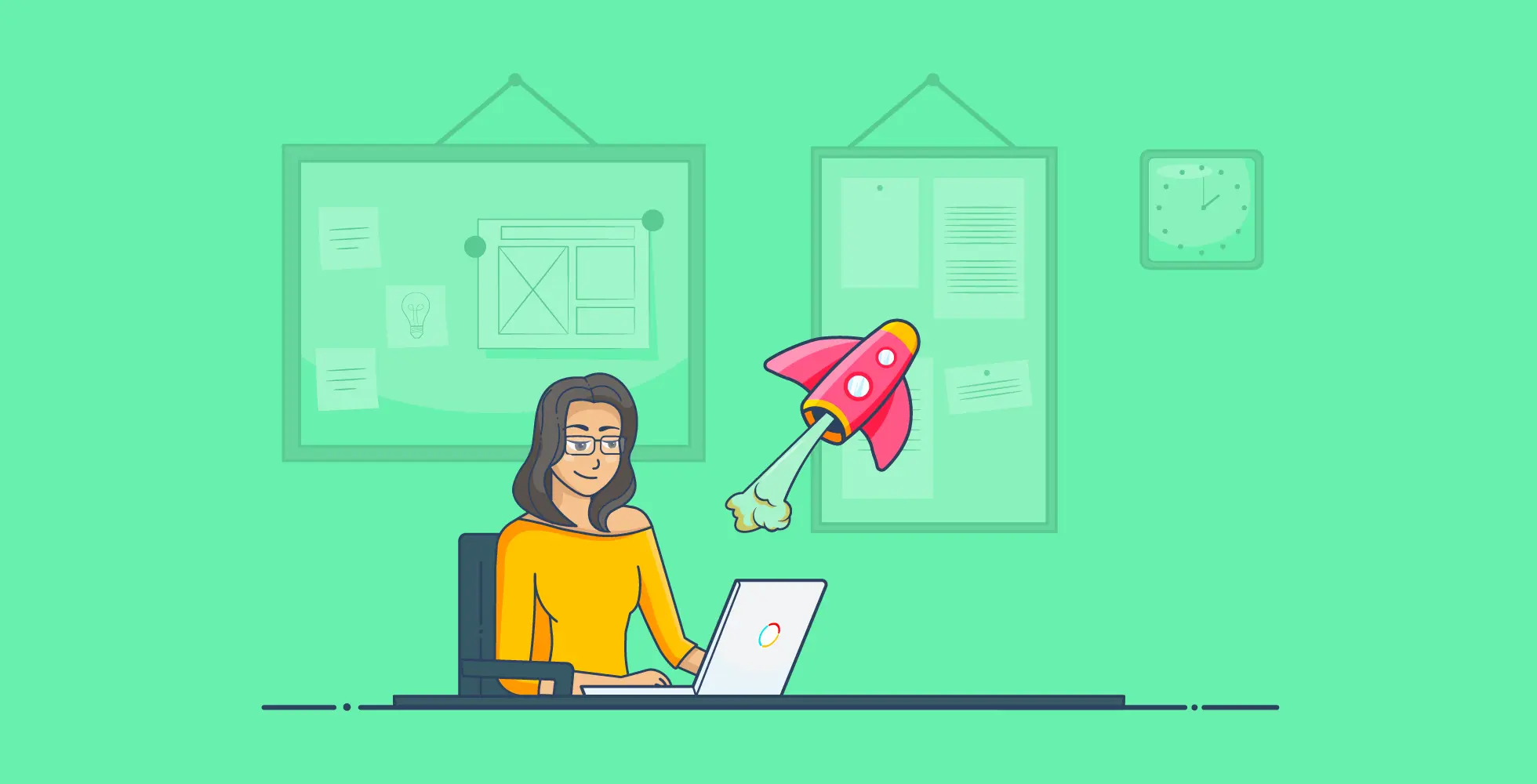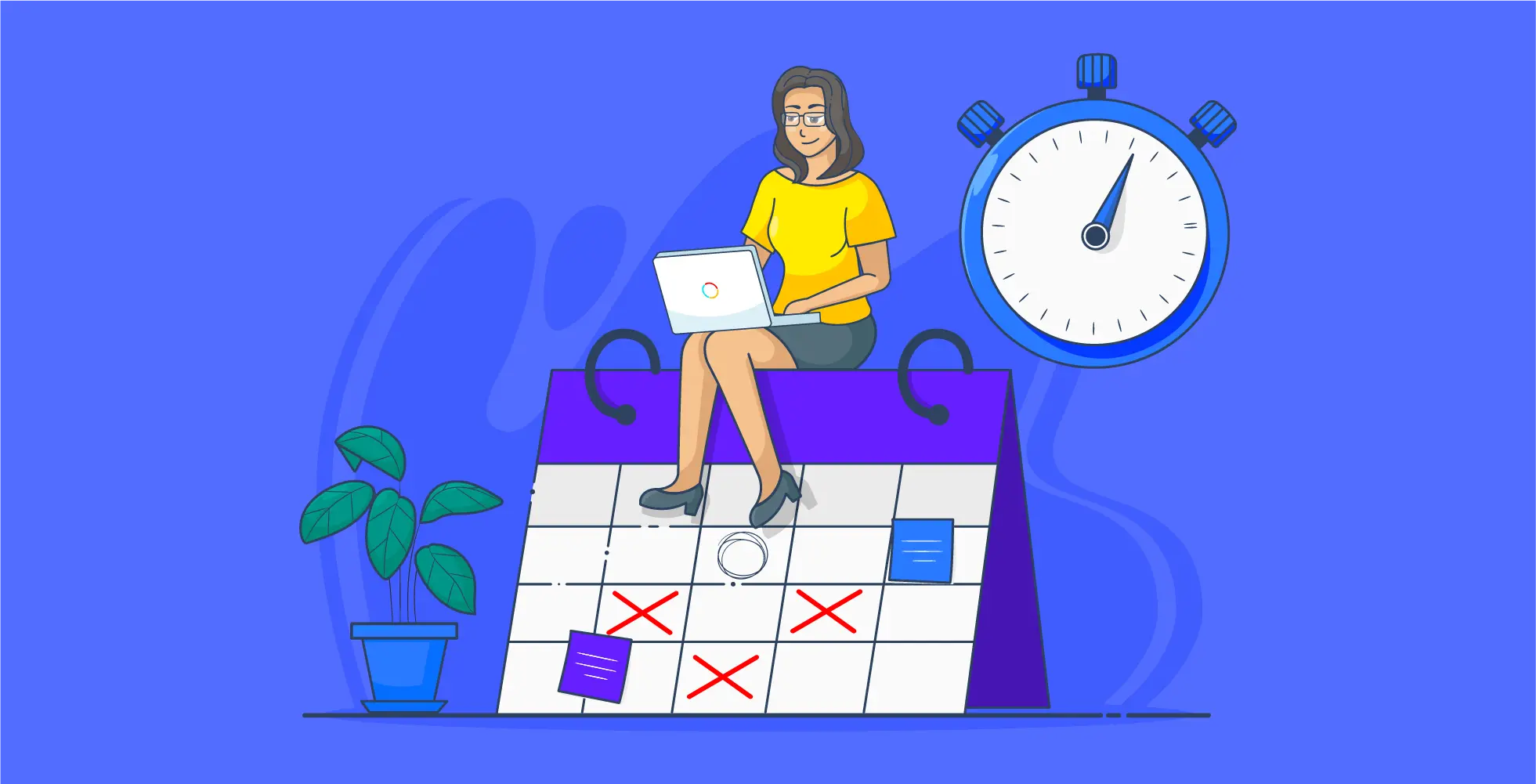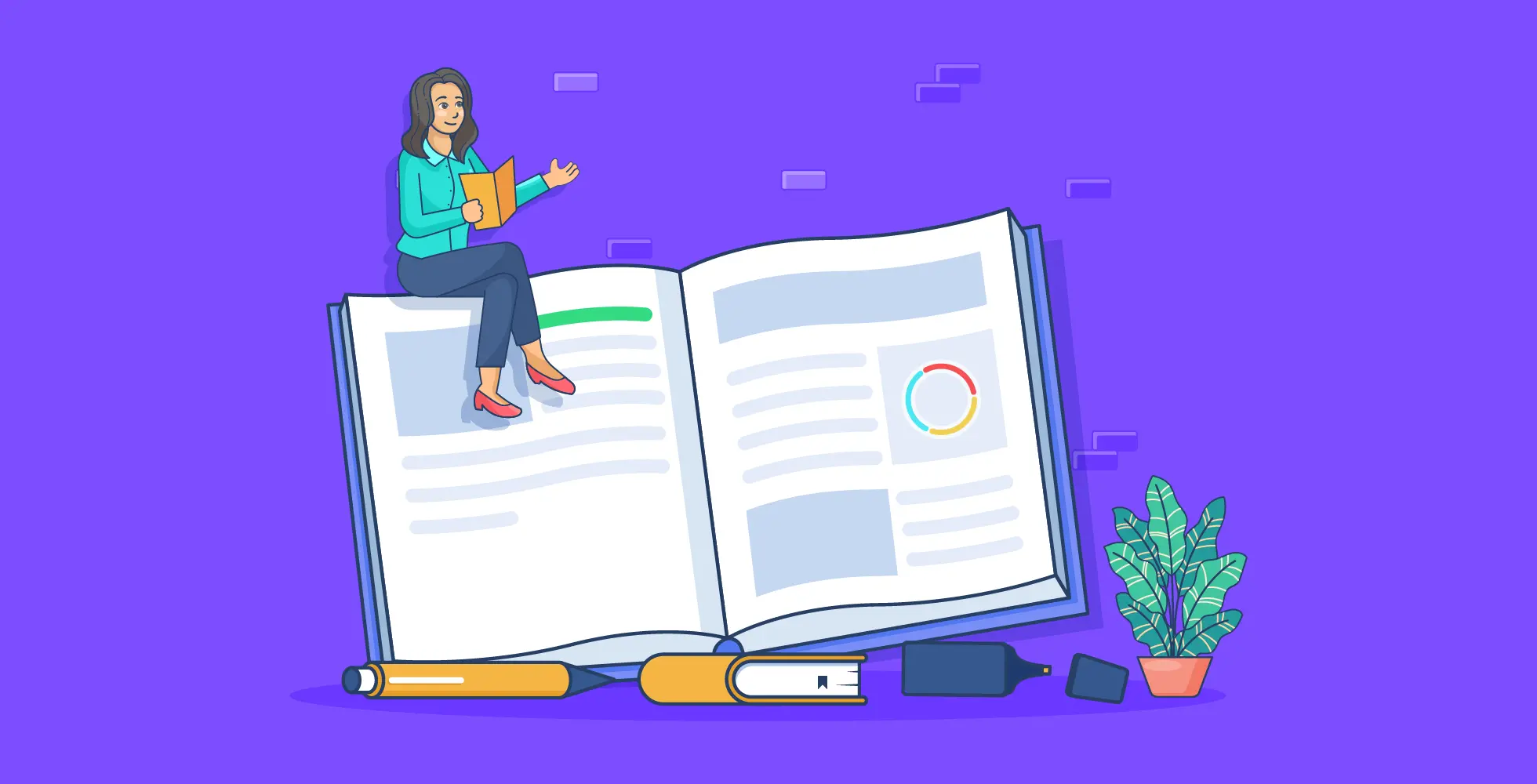As anyone who has ever tried to get work done knows, productivity is a tricky business. There are a million distractions vying for our attention, and it can be hard to stay concentrated on the task at hand.
However, there are a few simple tips that can help boost productivity levels.
Chapters
Chapter 1
Importance of Productivity
Why is Productivity important?
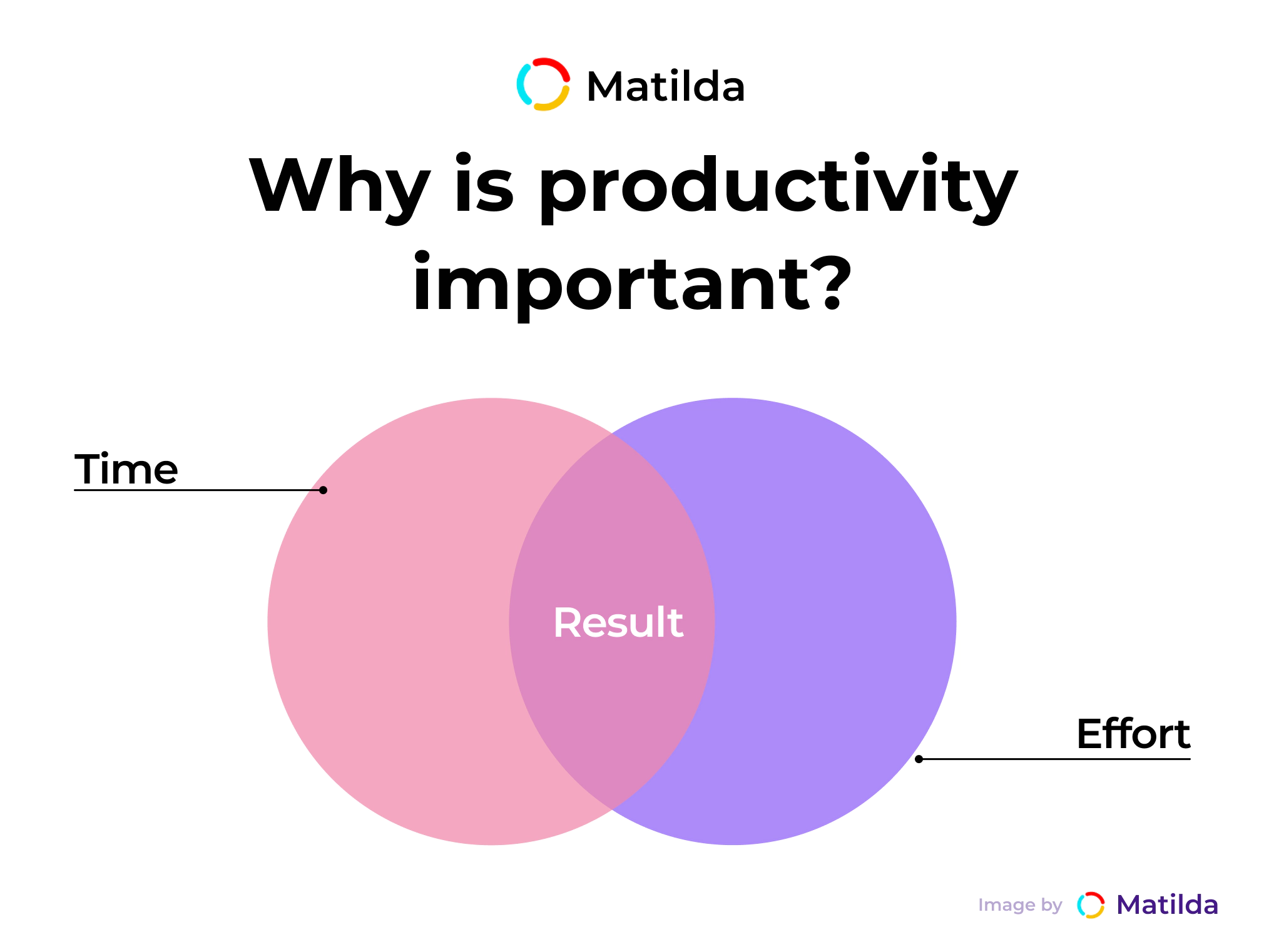 The ability to get a lot done in a short amount of time is a valuable skill in today’s fast-paced world. But what exactly is Productivity, and how can you achieve it? Productivity is simply the measure of how efficiently you’re able to convert your time and effort into results.
The ability to get a lot done in a short amount of time is a valuable skill in today’s fast-paced world. But what exactly is Productivity, and how can you achieve it? Productivity is simply the measure of how efficiently you’re able to convert your time and effort into results.
There’s no denying that productivity is essential. After all, what’s the point of working if you’re not getting anything done?
But let’s be honest: work productivity can be a bit of a bore. It’s often seen as something dry and dull, something that we have to force ourselves to do.
But it doesn’t have to be that way! In fact, there are plenty of ways to make work productivity more enjoyable.
Chapter 2
Productivity Measurement
How to measure your own Productivity
You can’t improve what you don’t measure. That’s why, if you want to increase your productivity, it’s important to start by measuring your current level of productivity. There are a number of different ways to do this, but one of the most effective is to keep a daily journal.
Each day, take a few minutes to record how much time you spend on each work and how much progress you make. At the end of the week, take a look at your journal and see where you can make some improvements.
You may be surprised at how much time you’re wasting on things that aren’t really important. By making some simple changes, you can start seeing a real increase in your productivity.
Chapter 3
Productivity Tips
Tips to stay Productive to get work done
So if you’re looking to get ahead at work, start by focusing on becoming more efficient with these productivity tips & hacks.
1. Make Commute Productive
Making phone calls and responding to emails are two things that can easily be done during your commute.If you need to make a phone call, do so while you’re on the train or bus. You can also use this time to catch up on weekly tasks, such as planning your schedule for the week or reviewing your to do list.
By making your commute productive, you can increase your overall productivity and get ahead of the game.
2. Spend the first few minutes of the Day getting Organized
One of the best ways to save time is to take a few minutes to organize your work. This may seem like a counterintuitive suggestion, but taking a little time to plan ahead can actually save you a lot of time in the long run.By taking a few minutes to think about what tasks need to be completed and in what order, you can avoid the wasted time that comes from starting and stopping projects throughout the day.
In addition, organizing your work can help you to avoid overlap and duplication, both of which can lead to lost time.
3. Do the Hardest, at the Beginning from the to do list
If you probably have a big list of things that you need to do. And if you’re like most people, that list is probably filled with a bunch of big projects and important tasks that you keep putting off because they seem too hard.
The best way to get those things done is to start with the hardest ones. That’s right, the best way to tackle your to do list is, to begin with, the hardest tasks.
Why? Because once you’ve crossed the big and important tasks off your list, the rest of the items will seem a lot easier in comparison.
4. Categorize your Tasks according to their Importance
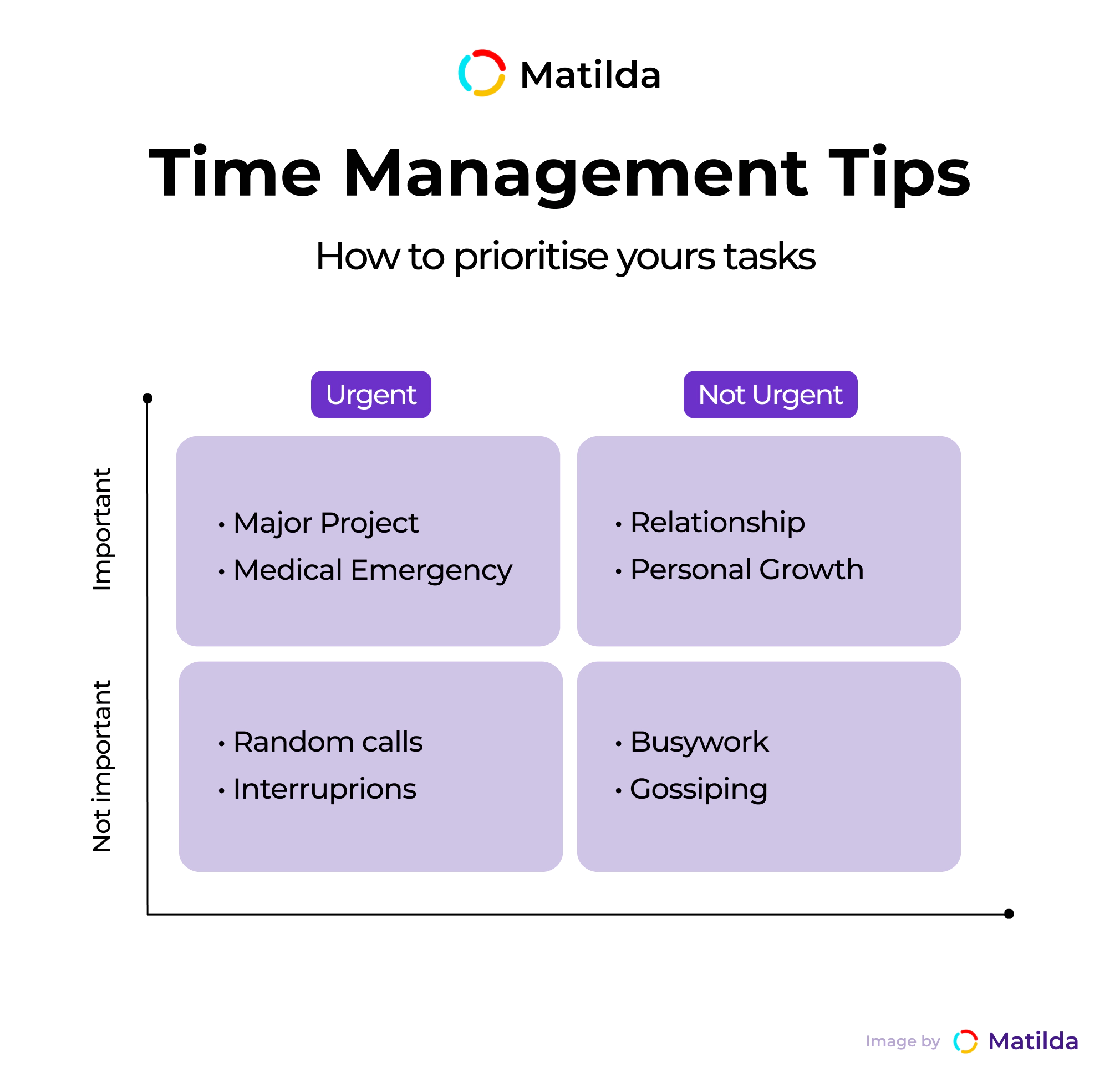 There are two types of people in the world: those who categorize their work and those who don’t. Categorizing your work can help you prioritize tasks and work more efficiently.Let’s say you have a list of tasks to complete. You can categorize them by importance or urgency.
There are two types of people in the world: those who categorize their work and those who don’t. Categorizing your work can help you prioritize tasks and work more efficiently.Let’s say you have a list of tasks to complete. You can categorize them by importance or urgency.
-Tasks that are important but not urgent can be put on the back burner.
-Tasks that are urgent but not important can be delegated to someone else.
-Tasks that are both important and urgent should be given priority.
By categorizing your work, you can ensure that you’re always working on the most important work first.
5. Break Big Tasks down into Smaller Activities
It seems like there’s always too much to do and not enough time to do it. Breaking down tasks into manageable pieces is the key to being productive.Instead of trying to tackle everything at once, prioritize your tasks and work on one thing at a time. Not only will this help you get more done, but you’ll also avoid wasting time.
6. Look for Emphasis and Concentrate on your Tasks
Staying concentrated can be tough, especially when there are so many distractions around us. When we’re trying to concentrate on work, our mental energy can quickly be depleted by outside stimuli.
It’s important to find ways to maintain our mental focus. One way to do this is to set specific goals for what you want to accomplish. This will help you to focus your attention and stay on track in life.
7. Use Time & Task Management Tools
Time & Task management tools are those which help us to manage daily tasks and better organize ourselves to complete projects. While they can be helpful, it’s important to remember that they are only tools. It’s up to us to use the tools at our disposal to help us meet our goals.
Time & Task management is not a one-size-fits-all endeavor, so find what works for you and stick with it. It might take some trial and error, but eventually, you’ll find the system that helps you make the most of your time.
Then sit back and enjoy the satisfaction of a job well done – with Matilda.io, with a little help from your friends, of course!
8. Identify your Peak Performance Hours
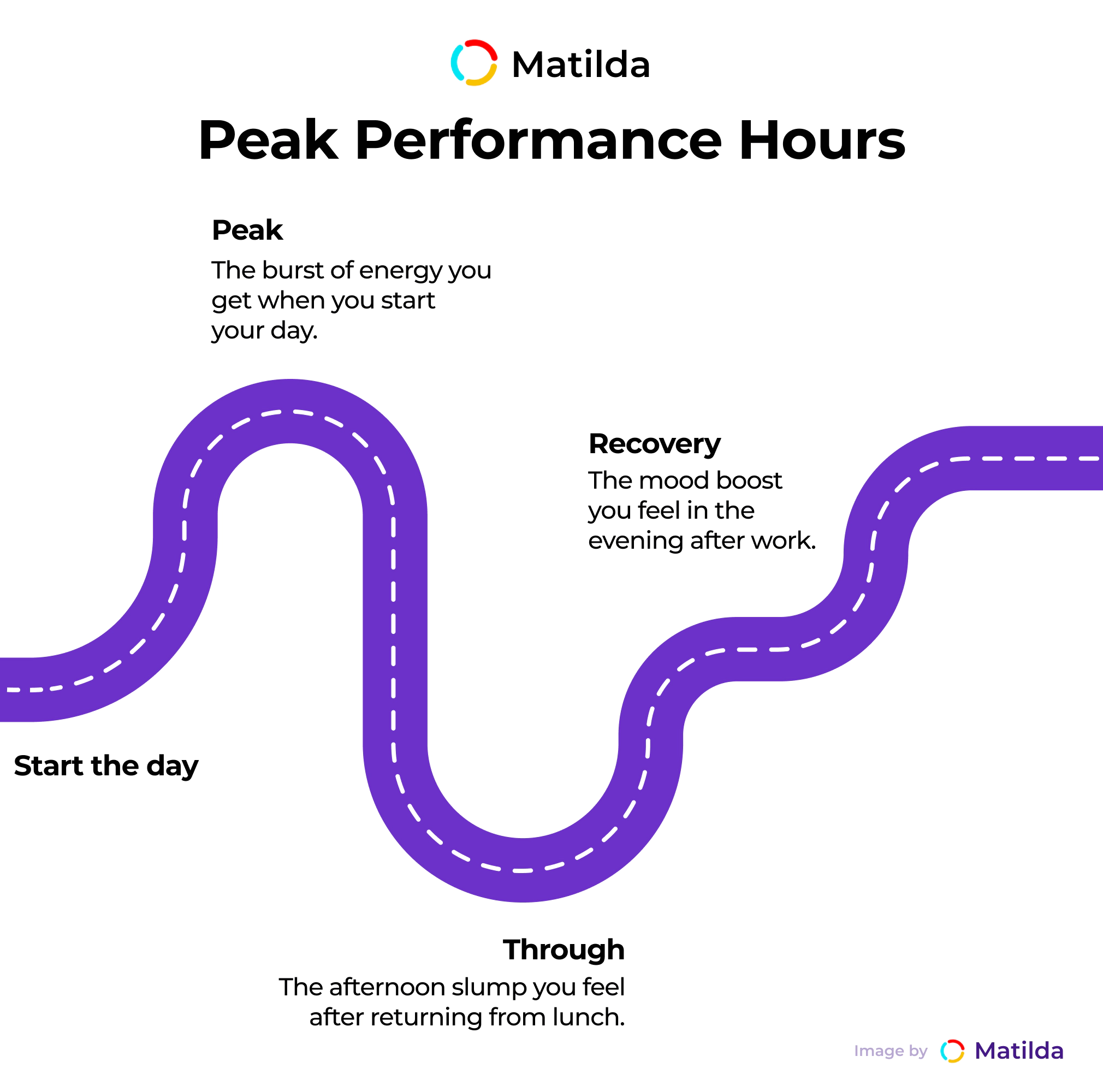 Most of us have experienced that feeling of being in the zone, where everything just seems to click and we can accomplish anything we set our minds to. This is what peak performance feels like.But what exactly are peak performance hours? And how can you identify your own?
Most of us have experienced that feeling of being in the zone, where everything just seems to click and we can accomplish anything we set our minds to. This is what peak performance feels like.But what exactly are peak performance hours? And how can you identify your own?
According to recent research, people have the most energy between 3 and 6 pm. So if you’re looking to get things done, that’s a good time to start.
Of course, everyone is different, so you’ll need to experiment a bit to figure out when YOU are most efficient.
9. Create a Schedule to Complete the Steps
Anyone who has ever tried to create a schedule knows that it can be a difficult process. There are so many factors to consider, and it can be hard to know where to start.However, by taking the time to create a personalized daily routine, you can take control of your time management. By scheduling each step of the project, you can ensure that you are making the most efficient use of your time.
10. Plan your Day ahead of Time
It’s important to plan your day ahead of time. That way, you can wake up in the morning knowing exactly what you need to do.Of course, things don’t always go according to plan. But at least if you have a plan, you’ll have a better chance of getting things done.
Plus, it’s always nice to have a sense of what’s coming next. So take a few minutes before bed each night to think about what’s important for the next day.
11. Subdivide your Time and your Tasks
Subdivide your time! And your tasks. But seriously, breaking up your day into smaller chunks can help you get more done.
If you have a big project to write, break it down into smaller tasks like research, outlining, and writing. Then, schedule specific times for each work. Dedicate an hour to research, an hour to outlining and writing, and so on.
By breaking up the project into smaller pieces, you’ll be less likely to feel overwhelmed and more likely to get it done.
12. Set Rest Blocks
As any worker knows, taking a break is essential to maintaining our efficiency. Though it may seem counterintuitive, a long break can actually help us to boost our creativity and improve our performance.By giving ourselves time to step away from our work, we allow our brains to recharge and approach problems with fresh perspectives.
In addition, setting aside time for personal activities helps us to stay motivated and focused on our goals.
13. Work in Short Bursts
By concentrating intensely on work for a short period of time, you can get more done than if you spread your efforts over a longer period.
Plus, you’ll feel less stressed because you’re not trying to juggle multiple tasks at once. This approach can be especially helpful when you’re dealing with complex projects that require your full attention.
14. Use the Pomodoro Technique for Enhanced Concentration
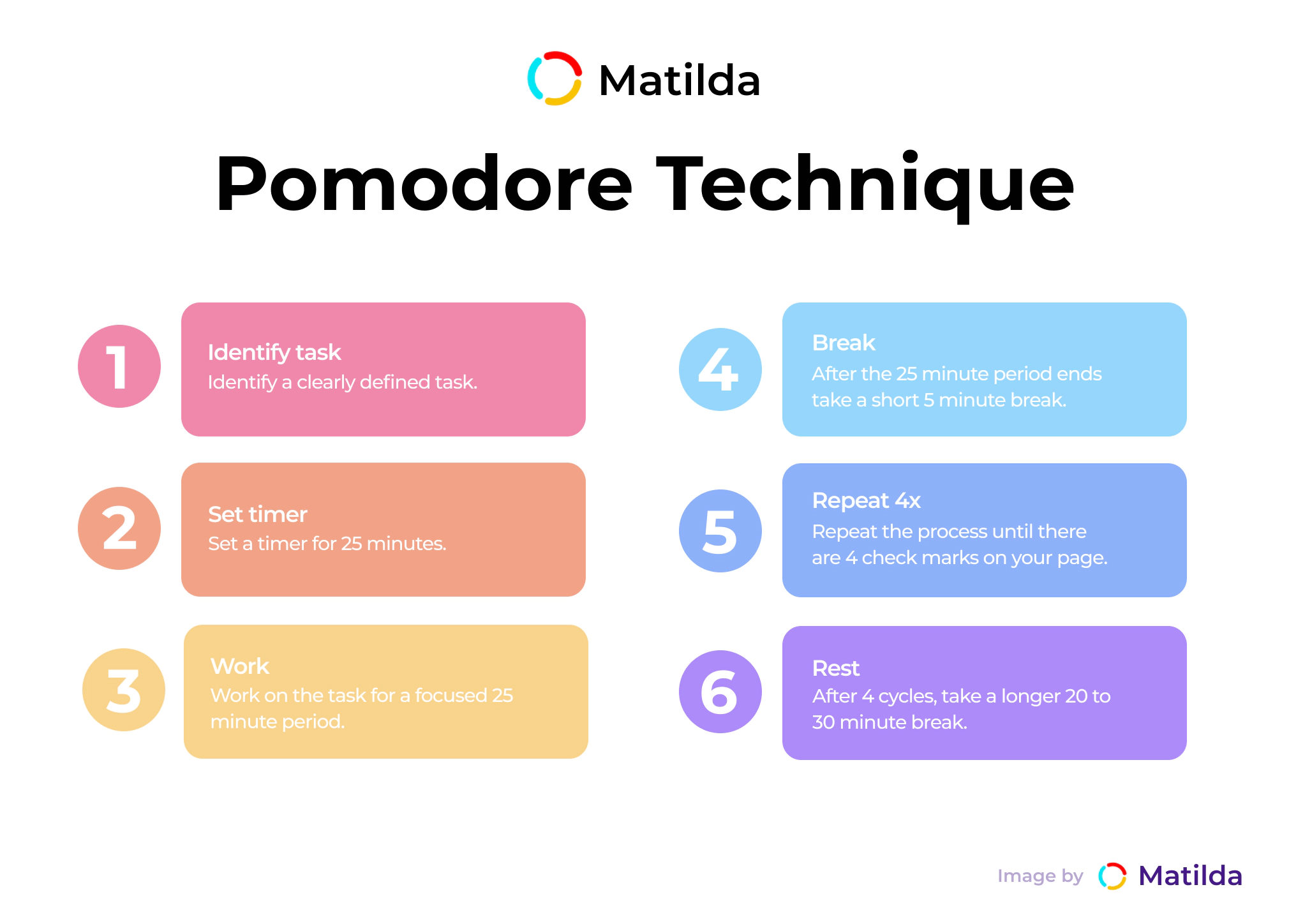
The Pomodoro Technique is a great way to train your brain to focus on one task at a time while working on other tasks.
The technique is simple: set a timer for 25 minutes and work on the task at hand until the timer goes off. Then take a five-minute break. Repeat this process four times, and then take a longer break.The key to making this technique work is, to be honest with yourself. If you find your mind wandering during the 25-minute interval, simply refocus and start again.
15. Opt for Automatic Processes to Optimize Working Time, Whenever you can
By automating repetitive tasks, you free up your brain power to concentrate on more important things. And who knows? Maybe you’ll even find that you enjoy your work a little bit more when you’re not wasting time on mundane tasks.
So next time you’re feeling stuck, remember: the answer may be as simple as letting go of some control and letting a machine do the work for you.
16. Create a Good Work Environment
A good work environment is important for maintaining a positive attitude and being productive. A clean and tidy desk can help you to feel organized and in control, while a comfortable chair will help you to stay concentrated and avoid backache.Taking regular breaks to stretch your legs or grab a coffee from a good coffee shop will also help to keep your work refreshed and alert.
In addition, it’s important to create an environment that encourages new ideas and creativity.
17. Think about What you are doing
All too often, people feel stressed and overwhelmed because they feel like they’re not getting enough done. They try to cram more and more into their days, and as a result, they end up feeling even more frazzled.The truth is, though, that you don’t necessarily need to work more hours in order to be productive. It’s often more effective to focus on quality over quantity. figure out what works for you and stick to it.
That way, you’ll be able to get the most out of your time without sacrificing your peace of mind.
18. Avoid distracting elements while you work
There’s nothing worse than trying to concentrate on your work, only to be constantly interrupted by outside distractions.
Whether it’s a loud noise, a bright light, or a constant stream of incoming emails, these things can waste time and make it difficult to get anything done. By minimizing distractions, you’ll be able to get more work done.
19. Set up a Social Media Blocker
Let’s face it, social media is a huge time-waster. Whether you’re mindlessly scrolling through your feed or getting sucked into an argument with a friend, it’s all too easy to waste hours.If you’re tired of watching your productivity go down the drain, it might be time to set up a social media blocker. By blocking access to sites like Facebook and Twitter, you can make sure that you stay concentrated on the task at hand.
Pro Tip
20. Meditation and getting some quality sleep
Anyone who has ever pulled an all-nighter can attest to the fact that more sleep usually means more productivity.
In fact, research shows that people who get more quality sleep tend to be more productive throughout the day.
By taking a few minutes to meditate each day, you can help to clear your mind and focus on the task at hand. And by getting some quality sleep, you can ensure that you’re well-rested and ready to take on whatever the day may bring.
So make sure to get plenty of rest and take some time to relax each day.
21. Make sure every task is related to a Goal
It’s easy to feel overwhelmed when you have a lot of jobs to do and no clear goal in sight.However, it’s important to make sure that every task you undertake is related to a larger goal. Otherwise, you’ll find yourself spinning your wheels and making little progress.
Even a small task can be worthwhile if it’s part of a larger plan. So next time you’re feeling overwhelmed, take a step back and make sure each task is helping you move closer to your goal.
22. Schedule notifications
By setting a reminder for yourself, you can keep your attention on complex problems.Here’s how it works: when you’re working on a complex problem, set a notification for yourself that says “It’s time to concentrate!” Then, when the notification goes off, you’ll know it’s time to get back to work.
By using this technique, you can train your brain to concentrate.
23. Wake up early & Exercise in the Morning
There’s no denying it – waking up in the morning can be tough. Whether you’re struggling to get out of bed or simply can’t seem to focus on the tasks at hand, it can be difficult to make the most of your day.However, there are a few simple changes you can make to help you wake up and start your day off right.
One of the best things you can do is to wake up early in the morning and get some exercise in. Not only will this help you to be more alert, but it will also increase your efficiency levels.
Plus, you’ll be able to enjoy a healthy breakfast in the morning before starting your day.
So if you’re looking for ways to improve your morning routine, be sure to give these tips a try. You’ll be glad you did!
24. Set a time to check emails
It has been said that email is the devil, and there is a lot of truth to that statement. Checking email can be a huge time suck, and it’s all too easy to get sucked into a never-ending cycle of answering emails.However, there is a way to break free from the Email trap: by setting a specific time to check and answer emails.
By setting aside just a few minutes each day to answer emails, you can stay concentrated and be more efficient.
25. Use slow switch multitasking not quick
Most people these days are always in a rush and trying to do too many things at once. They think that by multitasking, they will be more productive.However, this is not always the case. When you try to do too many things at once, you can quickly lose sight of what is important and end up making mistakes.
It is better to concentrate on one thing at a time and take your time with it. You will be surprised at how much more productive you can be when you slow down and use slow switch multitasking.
26. Learn how to say “no”
It’s important to learn how to say “no” when you’re trying to get things done. Otherwise, you’ll end up taking on too much and spreading yourself thin.
The best way to do this is to set priorities and stick to them. That way, you’ll know what’s important and can focus your energies on getting it done.
Learning how to say “no” is an important skill, but it’s one that takes practice. You’ll need to be able to say it firmly, without feeling guilty.
But once you master it, you’ll find that you’re able to get more done.
27. Team building activities
To delegate work properly and show appreciation, team-building activities are a great way to improve morale. From icebreakers to group exercises, there are endless possibilities for team-building activities. And the best part is that they don’t have to be expensive or time-consuming. Even something as simple as going out for lunch together with co worker can help to build team unity and improve communication.
So if you’re looking for ways to boost productivity, consider adding some team-building activities to your workplace.
28. Hydrate yourself
People don’t realize how important it is to hydrate themselves throughout the day. Not only does water help to keep your body functioning properly, but it can also help you to stay concentrated and increase your productivity.I often see people working long hours without taking a break to drink some water, and eventually, they start to lose sight of their goals.
So make sure you’re staying hydrated. Your body and mind will thank you for it!
Pro Tip
29. Set a time frame for meetings
When it comes to increasing productivity, there are a few key things to keep in mind.
First, define productivity for yourself. Is it getting through your to do list? Or is it something else? Once you have a clear definition, you can start to set some time frames for your meetings.For example, if you want to get through your to do list, set a limit of one hour for each meeting. This way, you’ll be able to focus on the important task at hand and not get sidetracked. Of course, this isn’t always possible, but it’s a good rule of thumb to keep in mind.
So try setting some time limits for your meetings and see how it affects your productivity!
30. Batch Similar Tasks
Productivity is often viewed as a numbers game. The more tasks you can check off your to do list, the more productive you are considered to be.
However, this way of thinking neglects the importance of quality over quantity. Instead of trying to accomplish as many tasks as possible, it may be more productive to batch similar tasks together. This allows you to focus your attention on a specific type of work and to complete it more quickly and efficiently.
Note
31. Use a Password Manager
There’s one tool that can help you increase your productivity: a password manager. A password manager is a software application that helps you generate, store, and manage passwords. It’s an important tool because it allows you to have strong, unique passwords for all your online accounts.This means that you don’t have to waste time coming up with new passwords or trying to remember old ones.
In addition, a password manager can help you organize your passwords by creating a priority list.
32. Give Your Deadlines a Makeover
One of the most important skills in time management is learning how to set deadlines. All too often, we underestimate how long it will take to complete work and end up scrambling at the last minute. This can lead to poor work quality, missed deadlines, and added stress.The good news is that there are some simple steps you can take to improve your deadline-setting skills.
First, start by estimating how long it will really take to complete the work at hand. Then, add 25% to that number to account for unforeseen delays. Finally, give yourself a reasonable time frame in which to complete the job.
By following these simple steps, you can make sure that your deadlines are realistic and achievable.
33. Let Go of Perfectionism
If you’re a perfectionist, you might think that your work is always going to be perfect. But the truth is, it’s not always going to be perfect. And that’s okay! In fact, striving for perfection can actually lead to less productivity.That’s because when things don’t go perfectly, you might spend more time wallowing in disappointment or trying to fix things that aren’t actually broken.
So instead of aiming for perfection, try letting go of that need for perfectionism.
34. Take Time to Reattach Yourself to Work Every Morning
When you first get to work in the morning, it can be tempting to just jump right into your job for the day. However, taking a few minutes to reconnect with your personal life can actually help you be more productive.For instance, you might take a moment to check your personal email or text messages. This way, you can avoid getting distracted by personal matters later on in the day.
Alternatively, you might use the time to catch up on the news or check social media. This way, you can stay up-to-date on current events and avoid having to do so during work hours.
35. Schedule Time for Self-Care
According to recent studies, good posture is essential for productivity. And, of course, the best way to achieve good posture is to schedule time for self-care. That’s right, in order to be productive, you need to take care of yourself first.But don’t worry, you don’t have to go to a Spa or anything. Just set aside some time each day to do other tasks that make you feel good. Whatever it is that makes you feel good, make sure to schedule it into your day.
36. Consider a Gadget-Free Desk
In today’s world, it’s easy to get caught up in gadgets and gimmicks. We are constantly inundated with new products that claim to make our lives easier and more efficient. But do they really?
According to most experts, the answer is no. In fact, many of these gadgets can actually lead to decreased efficiency. That’s why more and more people are opting for gadget-free desks.By decluttering your workspace and getting rid of distractions, you can create an environment that is conducive to focus and concentration. So if you’re looking to boost your productivity, consider ditching the gadgets and creating a simple, serene space to work in.
37. Ready Your Nibbles
If you’re looking to boost your productivity, you might want to consider nibbling on a few short periods snacks throughout the day. That’s right – short, healthy snacks can actually help you stay concentrated and energized so you can get more done.Of course, not just any old snack will do the trick. You’ll want to choose something that’s packed with nutrients and not too high in sugar.
38. Listen to Productive Music (or Sounds)
You should be listening to productive music that has been designed specifically to help you focus and get work done. These beats are scientifically proven to boost your concentration and improve your work output.So if you’re looking for an edge in work, listen to some productive music and get things done!
39. Find Ways to Set Up “Habit Stacking”
You know the feeling. You’re sitting at your desk, work is piling up, and you’re just…not…getting…anything…done. If this sounds familiar, you may need to find ways to set up “habit stacking” for productivity. This means creating new habits that will help you work efficiently.
So if you’re feeling overwhelmed by work, try habit stacking and see how it can help you get things done.
40. Make phone calls more productive
Have you ever made a phone call and felt like it could have been more productive? If so, you’re not alone.
In today’s fast-paced world, it can be difficult to make time for returning phone calls. However, there are a few simple steps you can take to make sure your phone calls are more productive.First, try to return phone calls within 24 hours. This will show the person you’re calling that you value their time.
Second, try to keep your calls focused. If you ramble on about unrelated topics, the person you’re talking to may not be able to remember what you discussed.
Finally, try to end your calls on a positive note. Thank the person for their time and let them know you appreciate their input.
41. Focus on one task at a time
Anyone who has ever tried to accomplish difficult work knows that focus is key. Whether you’re studying for an exam or trying to complete big projects, it’s important to be able to give your full attention to the task at hand. Unfortunately, this can be easier said than done.When you try to multi-task, your brain has to switch back and forth between tasks, which uses up more willpower and makes it harder to concentrate.
So the next time you’re feeling overwhelmed, take a deep breath and try to focus on one task at a time. You may be surprised by how much more productive you can be.
42. Procrastinate Procrastination
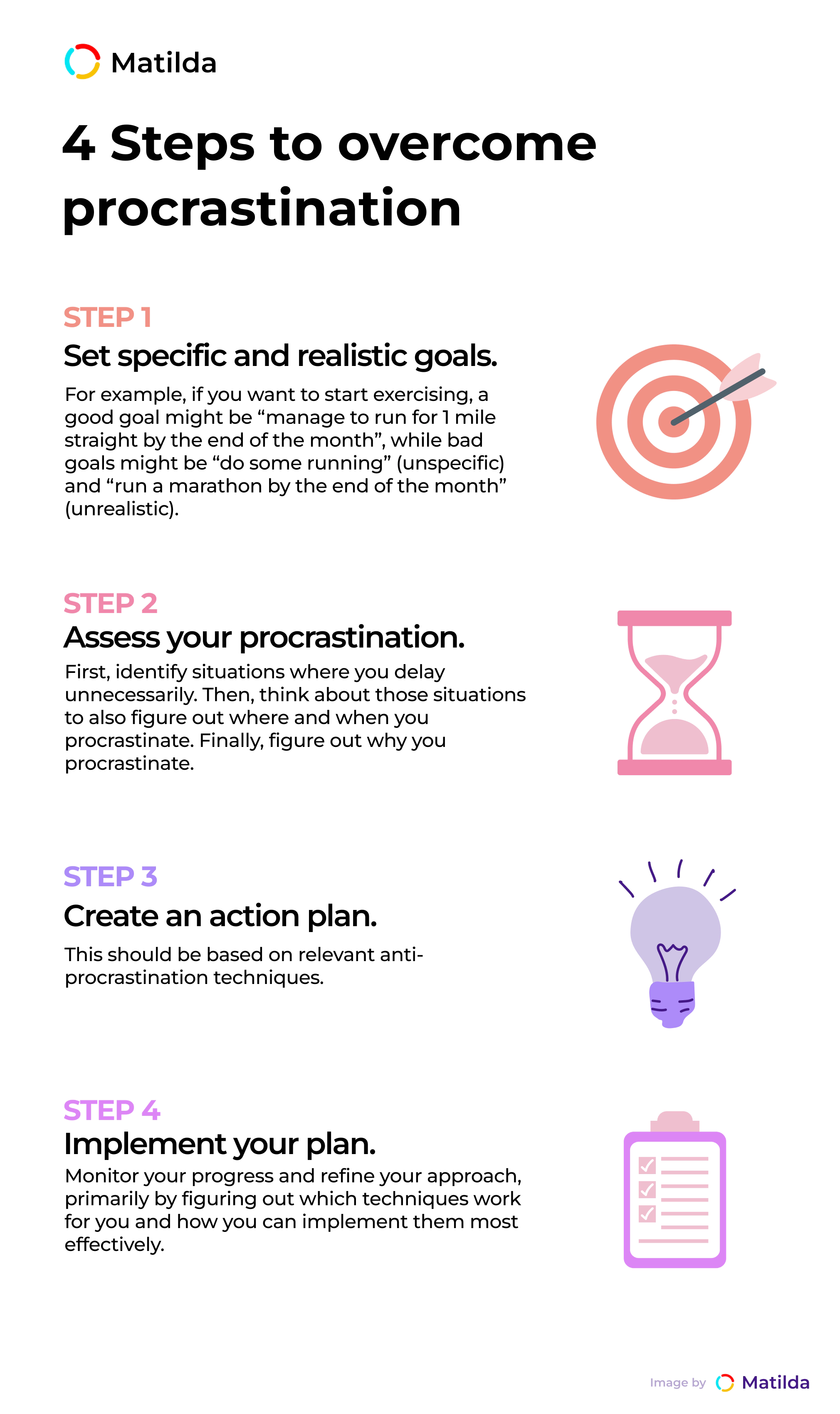 Productivity is defined as the efficient use of time to achieve a goal. However, many people fall into the trap of procrastination, putting off tasks until tomorrow.
Productivity is defined as the efficient use of time to achieve a goal. However, many people fall into the trap of procrastination, putting off tasks until tomorrow.
Unfortunately, Tomorrow never comes, and the work never gets done. This can result in a mounting pile of unfinished work, leading to feelings of anxiety and frustration.However, there is a way to beat procrastination and the key is to procrastinate procrastination. That is, instead of putting off a job until Tomorrow, do it Today.
Even if it’s just for five minutes, getting started on work can help to break the cycle of procrastination and get you moving towards your goal. So don’t wait – start working on that task from your to do lists today!
43. Delegate and Outsource
As any busy person knows, there are only so many hours in a day and you need to use those hours wisely. One of the best ways to do that is to delegate and outsource tasks that you either don’t have time for or that someone else can do better than you.For example, tech support is something that can take up a lot of time, but it’s usually better left to the professionals.
By delegating and outsourcing, you free up your time to focus on the things you’re good at and that are important to you.
44. Have Backups
For anyone who has ever had a long weekend ruined by a power outage, the importance of having a backup plan is clear. Having a backup plan means that you can continue to be productive even when things go wrong.Having a backup plan ensures that you can always get the job done.
Pro Tip
Conclusion: Final Thoughts on these productivity tips
So there you have it! Our top tips and hacks for productivity. We hope they help you get more done, in less time (or maybe even the same amount of time). But most importantly, we hope you have fun with them. After all, if being productive means having to be a boring robot all the time, who wants that?

